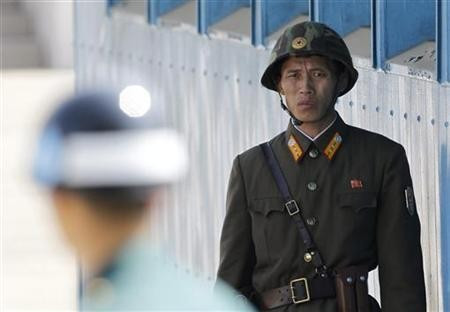Kim Jong-un Succession Spells Doom for North Korean Denuclearisation

Despite widespread speculation of a fresh start for North Korea, analysts have moved to quash reports that the death of Kim Jong-il will lead to denuclearisation of the rogue state.
Hopes of reopening discussions on the country's nuclear policy were first expressed by the UK government almost immediately after Kim Jong-il's death.
"This could be a turning point for North Korea. We hope that their new leadership will recognise that engagement with the international community offers the best prospect of improving the lives of ordinary North Korean people," said Foreign Secretary William Hague.
"We encourage North Korea to work for peace and security in the region and take the steps necessary to allow the resumption of the Six-Party Talks on denuclearisation of the Korean peninsula."
Experts believe, however, that the successor will maintain his father's hardline stance on the nuclear issue.
As is common with most North Korean policy and officials, little is known about Kim Jong-un even within his native country. With even his exact age a mystery all that is known about him is that his father had selected him for leadership and put in place a series of directives designed to ensure his succession.
Past this, information on Jong-un is less than favourable. Already a four-star general in the North Korean army, rumours from refugees and political sources suggest that he won his position by displaying a similar "mean streak" to his father. While what this "mean streak" actually refers to is a mystery, unconfirmed reports suggest that Jong-un is every bit his father's son and will continue his hardline stance on key issues including the country's nuclear programme.
State media has consistently reported that Jong-un will maintain his father's isolationist policies. References to the "Great Successor" have been taken to indicate that the new leader will continue the country's philosophy of juche, or self-reliance. The insistence of his succession has in turn led to concern that the regime change will not translate into a change in the country's hardline, isolationist, xenophobic policies.
The regime's insistence on continuing its nuclear programme has been a key problem in the country's attempts to rejoin the international community. The programme was a contributing factor to the end of South Korea's "Sunshine Policy" of more engagement and was the focus of the recently stalled Six-Party Talks.
The talks began in 2003 when North Korea withdrew from Nuclear Non-Proliferation Treaty. The strategy had garnered some success during the fifth and final run of talks, when the North agreed to shut down its nuclear facilities in exchange for fuel aid. That agreement collapsed in April 2009 when the UN Security Council commented on a failed satellite launch that angered North Korea.
The Sunshine Policy was spearheaded by then-South Korean president Kim Dae-Jung and was initially successful. It led to two Korean summit meetings in Pyongyang, both of which led to political breakthroughs between the countries.
As with previous attempts at detente, the policy soon fell apart over the nuclear weapons programme and was dubbed a failure in November 2010.
© Copyright IBTimes 2025. All rights reserved.





















